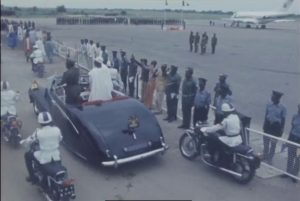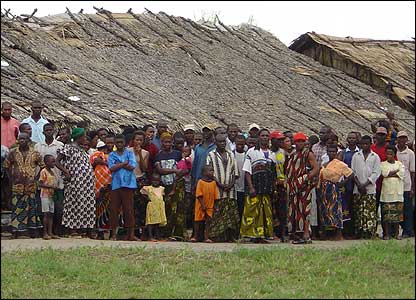
Bakassi; a disputed territory between Nigerian and Cameron. The Bakassi peninsula is a maritime region within the eastern estuary of Cross River, it is one the most prolific food baskets which attracted the Efik, a largely fishing people who have inhabited the lower Cross River since the sixth century. The whole of Bakassi Peninsula is an extension of Akpabuto; both form a contiguous landscape, cut through in the north by Akpayafe River in Cameroon. Efik fishermen had settled there from the remotest period of Efik expansion.
International Court of Justice at Hague court ruled on Thursday, October 10 that “pursuant to the Anglo-German Agreement of March 11. 1913, sovereignty over Bakassi lies with Cameroun, a judgement which threw up threw up a crisis of identity for the people of Bakassi, and resentment so much that there was a song of war in the air. Cameroun had stepped up aggression over Bakassi since the invasion of the area in 1981 by her troops. Then, six Nigerian soldiers were killed. In 1996, two years after she went to court, Cameroun again Invaded the area, twice, in February and May. Also, in 1997, the country invaded the place twice and over 300 Nigerians were allegedly held captive[i]. With sheer determination and clear focus on the primacy of peace, President Obasanjo, himself a war hero, resolved to pursue the path of peace. The process of a peaceful resolution of the Bakassi issue has now been nearly concluded with the signing of the Greentree Agreement and resettlement of the persons displaced[ii].
Southern Cameroon agitation
Southern Cameroun which lays claim to the peninsula is planning to secede and become a sovereign country to be called Ambazania. In concert with the English-speaking Southern Cameroun, they want to stand up as Ambazania, an indepen- dent entity. The Southern Cameroons People’s Organisation (SCAPO) is the arrowhead of this agitation. Their argument has a resem- blance to the 1931 British treaty (which was never nullified), ceding Bakassi to Germany. In other words, according to Ambazania agitators; this implies that the Anglo-French treaty of 9 January 1931 between Sir Graeme Thomson, Governor of the Colony and Protectorate of Nigeria and Monsieur Merchand, his Cameroonian counterpart still defines a valid international treaty. SCAPO believes that though the ICJ ruling proclaimed that sovereignty over Bakassi does not belong to Nigeria, it failed to state which ‘Cameroun’ it is referring to. SCAPO argued further that the Southern Cameroon which was a United Nations Trust Territoty under the United Kingdom administration never had an agreement for a union with, the Republic of Cameroun. Consequently, in the absence of a legally binding agreement between these two former UN trust territories, it means that the Southern Cameroons are still, under international law, a separate legal entity from Cameroun.
Efik’s Bakassi
The first Efik man who cleared a portion of the Bakassi forest on the peninsula for his fishing hut was one Akai Abasi, a native of Obutong in Old Calabar. The name Bakassi is a corruption of Akai Abasi in the early 18th Century by British colonialists . The name allegedly came after the signing of the “Asiento” Treaty between Great Britain and Spanish American imperialists which empowered Britain to supply 4,800 slaves annually for 30 years. Britain took advantage of the monopoly of slave traffic in the Guinea coast from the period and was frequently around the peninsula. When Britain took control of the Oil Rivers Protectorate which included Calabar and its surrounding villages after the Berlin Conference of 1883-84, the place was administered from Ikot Nakada in Akpabuyo . The boundary with the Cameroon Colony administered by German colonisers was Derel-Rey. Names of inhabitants of the peninsula are basically Efik and tbibio, Common names’of settlements named after the original inhabitants of the. Villages include Archibong Town, Ekanem Esin, Edem Abasi, Inua Mba, Ine Akpak, Atabong West, Atabong East. It is not uncommon to see villages predominantly inhabited by Ijaw and Ilaje who migrated from those areas to the peninsula.

Colonisation Of Bakassi
At the beginning of the 19 th century, Britain came on board to administer the Oil Rivers Protectorate. It was not in dispute then where. Bakassi belonged. It was with this understanding that the colonial boundary between the British and Germans was at the Rio-del-Reywater way behind the Bakassi coast since 1893. However, trouble started when the German colonialists that administered Cameroon discovered that the Rio-del-Rey water was not navigable into the territory of the Cameroon. The Akpayafe River that drains from the Cameroon mountain flows almost along the eastern Bakassi border with Cameroun and drains into the Cross River estuary instead of pouring into the Rio-del-Rey.
It was in the bid to navigate easily into Cameroun territory that the German colonial officials entered into a secret agreement with British officials which was not to the knowledge of their home governments in London and Berlin. This was vehemently rejected by Mr. Harcourt, the Colonial Affairs Secretary, with the claim the government has never entertained and would not entertain such proposal for a shared responsibility between Britain and Germany over any part of its colony. He told a delegation of Calabar chiefs who went there to protest the alleged agreement between the colonial officials. This treaty was, however, one of the exhibits considered by justice Maurile of the World Court at The Hague in delivering judgment in favour of Cameroon on 20 October 2002.
Gowon’s Gift
In 1975, General Yakwubu Gowon, Nigeria’s head of state, visited Yaounde, Cameroun. In a meeting with Ahmadou Ahidjo, the head of state of Cameroun, Gowon was said to have agreed to hand over the peninsula to Cameroun, following a request from his host. This was called the Maroua Declaration and was one of the documents tendered by Cameroun at the World Court. Cameroun used this gift as an excuse to invade the place, harass, maim and kill residents of the peninsula. But in 1995 General Sani Abacha decided to resist such invasion by sending a military contingent to the place. Abacha, backed by the then Provisional Ruling Council (PRC), realizing that the territorial integrity of the nation was threatened by Cameroon, sent in the contingent to restore order and discipline in the Bakassi Peninsula[iii].
Bakassi People
Bakassians have considered a fallback position. They will bid Nigeria goodbye if Nigeria gives them up. But they will not have anything to do with Cameroun either. The idea that they should join the Amazonian Republic being mooted does not appeal to them. Cameroun has no stake in Bakassi, or presence. Unlike the Lake Chad area, the people of Bakassi never moved from the sphere they were since 1850, a time which the Anglo-German agreement of 1913 does not predate[iv]. Renowned activist, Femi Falana was arrested in 1994 at Mushin, Lagos for participating in a Campaign for Democracy-organised rally over the disputed Bakassi Peninsula[v].
[i] The News, October 28, 2002
[ii] The News, May 28, 2007
[iii] The News, July 3, 2006
[iv] TELL November 17, 2003
[v] The News March 31, 2008
